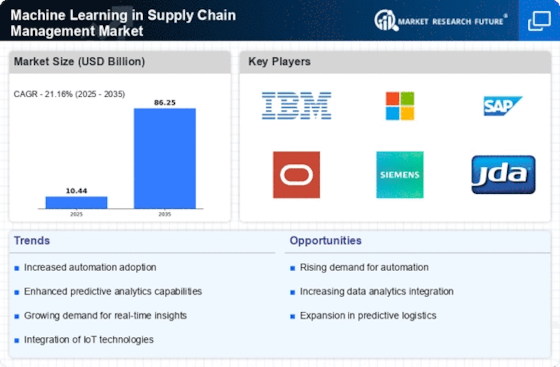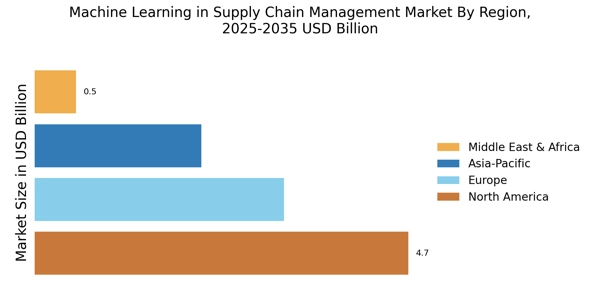Supply Chain Optimization
In the Machine Learning in Supply Chain Management Market, optimization of supply chain processes is becoming increasingly vital. Machine learning algorithms can analyze vast datasets to identify inefficiencies and suggest improvements. For instance, companies can optimize routing for logistics, reducing transportation costs and delivery times. Research indicates that organizations implementing machine learning for supply chain optimization can see a reduction in operational costs by as much as 20%. This optimization not only enhances efficiency but also supports sustainability initiatives by minimizing waste, thus driving growth in the Machine Learning in Supply Chain Management Market.
Enhanced Demand Forecasting
The Machine Learning in Supply Chain Management Market is witnessing a surge in demand forecasting capabilities. By leveraging advanced algorithms, organizations can analyze historical data and identify patterns that inform future demand. This predictive capability is crucial, as it allows companies to optimize inventory levels, reduce stockouts, and minimize excess inventory. According to recent estimates, businesses utilizing machine learning for demand forecasting can achieve accuracy improvements of up to 30%. This enhanced forecasting not only streamlines operations but also contributes to cost savings and improved customer satisfaction, making it a pivotal driver in the Machine Learning in Supply Chain Management Market.
Risk Management and Mitigation
The Machine Learning in Supply Chain Management Market is significantly influenced by the need for effective risk management. Machine learning models can predict potential disruptions by analyzing various risk factors, such as supplier reliability and geopolitical events. This predictive capability enables organizations to develop contingency plans and mitigate risks proactively. As supply chains become more complex, the ability to foresee and address risks is paramount. Companies that adopt machine learning for risk management can potentially reduce the impact of disruptions by up to 40%, underscoring its importance in the Machine Learning in Supply Chain Management Market.
Cost Reduction and Efficiency Gains
Cost reduction remains a primary focus within the Machine Learning in Supply Chain Management Market. Machine learning technologies facilitate the automation of routine tasks, leading to significant efficiency gains. By automating processes such as order processing and inventory management, organizations can reduce labor costs and minimize human error. Studies suggest that companies implementing machine learning solutions can achieve cost reductions of up to 25%. This drive towards efficiency not only enhances profitability but also allows organizations to allocate resources more effectively, further propelling growth in the Machine Learning in Supply Chain Management Market.
Improved Supplier Relationship Management
In the Machine Learning in Supply Chain Management Market, enhancing supplier relationship management is increasingly recognized as a key driver. Machine learning tools can analyze supplier performance data, enabling organizations to identify the most reliable partners and negotiate better terms. By fostering stronger relationships with suppliers, companies can ensure more consistent quality and timely deliveries. This strategic approach not only improves operational efficiency but also enhances overall supply chain resilience. As organizations continue to prioritize supplier collaboration, the role of machine learning in optimizing these relationships is likely to expand within the Machine Learning in Supply Chain Management Market.

















